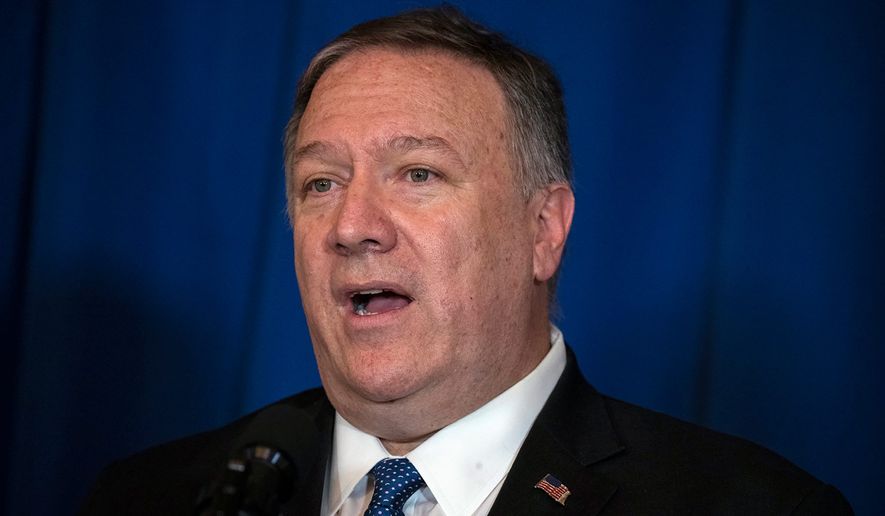The Trump administration’s policy of pressuring Iran ultimately will alter Tehran’s behavior on such issues as curbing its nuclear and missile development programs and ending support for terrorism in the region, Secretary of State Mike Pompeo argues.
In addition to supporting regional allies, “we have at the same time run an incredibly effective campaign to work to convince the ayatollah that it is unacceptable to proliferate nuclear weapon systems and to conduct terror campaigns around the world,” Mr. Pompeo said in a recent exclusive interview.
The United States is working on several fronts to pressure the Iranian government, including by imposing economic sanctions and increasing U.S. military forces in the region. “We’ve had a full-on global diplomatic campaign,” he said.
The United States continues to work with the Europeans to solve the problem of Iran, although most European nations have chosen to remain in the 2015 nuclear agreement.
A replacement agreement to the 2015 international nuclear deal with Iran, known as the Joint Comprehensive Plan of Action (JCPOA), is possible, Mr. Pompeo said, but not until Tehran fundamentally alters its policies.
“I think we now can see what a failed agreement that was,” Mr. Pompeo said. “We are months away from the Iranians being allowed under the JCPOA to purchase conventional weapon systems from Russia and China.”
The U.N. embargo on arms sales to Iran will end in October, and China and Russia are expected to begin selling weapons systems to the regime.
Mr. Pompeo said U.S. policy toward Iran is better than the more conciliatory approach adopted by the Europeans.
“We think this puts the regime in a position where they will ultimately conclude it’s in their best interests to sit down with the United States and come to a resolution across that broad range of systems that is both broader and extends for a period of time that is consistent with the way the world really works today, not what [former Secretary of State] John Kerry and [lead Iran deal negotiator] Wendy Sherman did to essentially create an automatic pathway to a nuclear-capable set of weapon systems,” he said.
A coalition of nations has been formed to limit Iranian threats to close the strategic Strait of Hormuz. Many nations still rely on the waterway, though the United States has reduced its heavy dependence on Middle East oil through domestic production.
“It’s a very successful undertaking that has significant military and diplomatic components to it,” Mr. Pompeo told The Washington Times.
Mr. Pompeo said the United States continues to seek Iran’s adoption of 12 demands that the secretary of state outlined in a May 2018 speech.
The demands include full disclosure of past military-related nuclear activity, halting enrichment of uranium and providing the International Atomic Energy Agency with greater access to Iranian nuclear sites.
Tehran also must end its proliferation of missiles and the development of missiles capable of delivering nuclear arms.
The United States also wants an end to Iran’s support for international terrorism, including the regime’s backing of such groups as Hezbollah, Hamas and Palestinian Islamic Jihad. Supporting the Taliban and harboring al Qaeda also must end.
“Our mission set was very clear. We laid down the 12 things that we asked Iran to do,” Mr. Pompeo said. “I cumulatively describe them as ’behave like a normal nation.’”
Mr. Pompeo said Iran also must release all Americans it is holding. “We want all the Americans that are being held there to be returned,” he said.
• Bill Gertz can be reached at bgertz@washingtontimes.com.




Please read our comment policy before commenting.